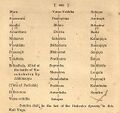Bhagavata Purana
The Bhāgavata Purāṇa (ca. 9th-13th c. AD) (भागवतपुराण) (also known as Śrīmad Bhāgavatam, or Bhāgavata) is one of the "Maha" Puranic texts of Hindu literature, with its primary focus on bhakti (devotion) to the incarnations of Vishnu, particularly Krishna. The Sanskrit text comprises twelve skandas (cantos or books) and some 18,000 verses. The Bhāgavata includes many stories well known in Hindu tradition, including the various avatars of Vishnu and the life of Krishna.
Period
Majority of the modern scholars date the extant version of the Bhagavata Purana to the ninth or tenth century CE.
Referred to as the Fifth Veda
The Bhāgavata takes the form of a story recounting Vyasa's work being recited for the first time by his son Śuka to the dying King Parikshit, who owes his life to Krishna. Longing to hear of Krishna before he dies, Śuka recites the Bhāgavata to Parikshit over the course of seven days. The Bhāgavata is widely recognized as the most well known and influential of the Puranas, and is sometimes referred to as the "Fifth Veda".
The Bhāgavata is a recounting of events by the storyteller Ugrasrava Sauti (Sūta) to Saunaka and other sages assembled in the Naimisha Forest. As Sūta explains, Veda Vyasa was feeling unsatisfied, even after he made divine knowledge available to humans by writing the Vedas and the Mahabharata. The sage Narada, in his role as intermediary between gods and men, visited Vyasa to inform him that his unease was because he had not yet described the highest goal of knowledge—bhakti, or devotion to God.
Narration
Sūta recounts the first recital of Vyasa's work, given by Vyasa's son Śuka to King Parikshit, the grandson of Arjuna. Parikshit, who owed his life to Krishna, had angered a rishi's son for being disrespectful to the rishi's father. He was cursed to be bitten by a poisonous snake and had only seven days to live. Fasting by the banks of the Ganges River, and with Krishna no longer alive, Parikshit longed to hear of him. The Bhāgavata introduces the life of Parikshit as background, thus bringing Krishna into the story, and is presented as part of Śuka's recital over the course of seven days. It concludes with Śuka asking Parikshit the standard, "What more do you want?"(12.5.13) Completely satisfied with what he has heard and his purpose in life fulfilled, Parikshit dies.(12.6.12-15)[6]
Gallery of Ancestry from Bhagavata Purana
Reference - A study of the Bhagavata Purana; or, Esoteric Hinduism by Purnendu Narayana Sinha, Benares,1901
-
Bhagavata Purana p.186 (Nriga)
-
Bhagavata Purana p.187 (Marutta)
-
Bhagavata Purana p.193 (Ikshavaku)
-
Bhagavata Purana p.195 (Mandhata
-
Bhagavata Purana p.197 (Bahuka)
-
Bhagavata Purana p.199 (Khatvanga)
-
Bhagavata Purana p.199 (Dasharatha)
-
Bhagavata Purana p.199 (Kusha)
-
Bhagavata Purana p.200 (Kusha)
-
Bhagavata Purana p.201 (Nimi)
-
Bhagavata Purana p.202 (Kesi Dvaja)
-
Bhagavata Purana p.207 (Pururava)
-
Bhagavata Purana p.209 (Yayati)
-
Bhagavata Purana p.210 (Bhardvaja)
-
Bhagavata Purana p.211 (Ajamirha)
-
Bhagavata Purana p.212 (Kuru)
-
Bhagavata Purana p.213 (Dhritarashtra)
-
Bhagavata Purana p.214 (Arjuna)
-
Bhagavata Purana p.215 (Magadha)
-
Bhagavata Purana p.216 (Bali)
-
Bhagavata Purana p.217 (Adhiratha)
-
Bhagavata Purana p.218 (Yadu)
-
Bhagavata Purana p.219 (Sasavindu)
-
Bhagavata Purana p.220 (Navaratha)
-
Bhagavata Purana p.221 (Andhaka)
-
Bhagavata Purana p.222 (Sini)
-
Bhagavata Purana p.223 (Sarana)
-
Bhagavata Purana p.225 (Pradyota)
-
Bhagavata Purana p.226 (Chivilaka)
Back to Purana





























